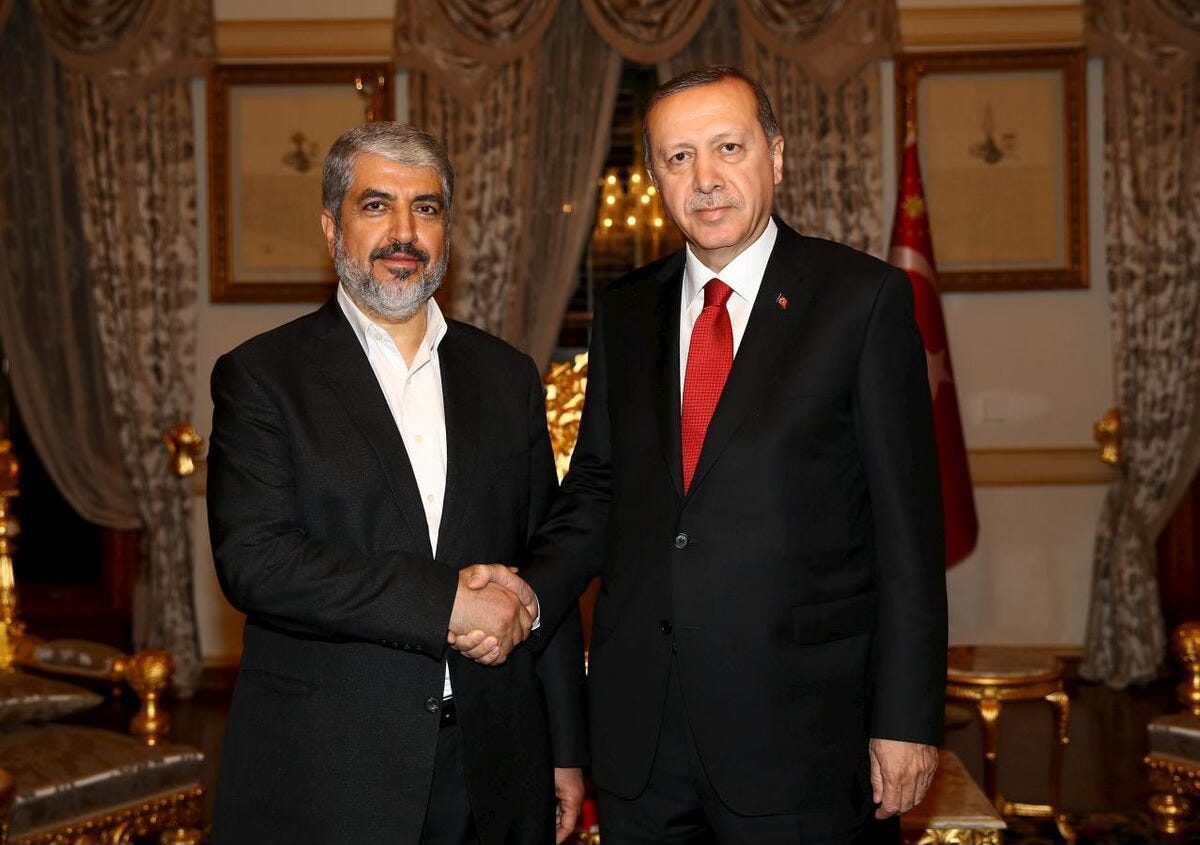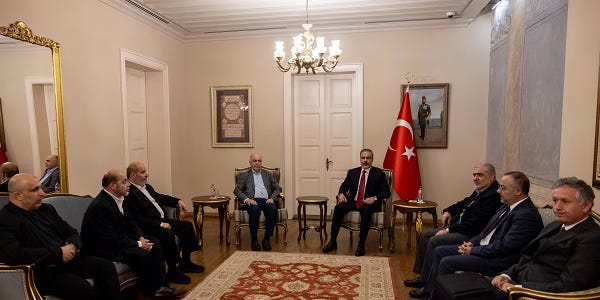Is Turkey the new Hamas HQ?
The U.S. suddenly dramatizes Turkey's ties with Hamas, despite being fully aware of every step in this relationship for decades. Now, the real question isn’t Turkey’s role—it’s Washington’s endgame.

It began a couple of weeks ago.
Qatar announced it had told Hamas and Israel it would pause its efforts to mediate a Gaza ceasefire and hostage deal until both sides showed seriousness about resuming talks.
Then came the evergreen news: reports that Qatar had expelled Hamas leaders and would no longer host them. This kind of story resurfaces every six months, as if on a timer—’ Qatar fed up with Hamas’, ‘Hamas moving out’, ‘Qatar kicking them out.’ As if such decisions are within either party's full control. As if both are truly 'free' to act as they please.
Qatar denied the claims, of course, but stated that Hamas’ top brass have since been seen shuttling between other major capitals.
Shortly after, the U.S. Treasury announced sanctions on six senior Hamas officials, three allegedly living in Turkey: Abd al-Rahman Ghanimat, Musa Akari, and Salama Mari. Ghanimat, a long-standing member of Hamas’ Izz Al-Din Al-Qassam Brigades, and Akari and Mari, financial facilitators for the group, were linked to several terror attacks. Akari’s backstory is especially noteworthy. Released in the 2011 Gilad Shalit prisoner swap—where Israel exchanged one soldier for over 1,000 prisoners—he was deported to Turkey.
The sanctions sparked speculation that Turkey might become Hamas’ new base.
Ankara denied it, insisting that Hamas members only visit “from time to time.” But Washington chimed in.
State Department spokesperson Matthew Miller, when asked about Hamas leaders relocating to Turkey, neither confirmed nor denied but remarked, “We don’t believe the leaders of a vicious terrorist organization should be living comfortably anywhere, including in a major city of a NATO ally.”
Meanwhile, domestic opposition grew increasingly uneasy, amplifying concerns over the implications of Hamas’ alleged presence. The leader of the CHP, Özgür Özel, said, ‘I worry that Israel might not target Turkey directly through its military but could openly support terrorist organizations within Turkey, provide them with logistical assistance, and engage in certain operations in Turkey, either through covert organizations or terrorist groups. This would put Turkey in a very troubling position that none of us would want. For this reason, I’ve conveyed this concern to everyone who might be able to relay it to Erdoğan, to the best of my ability. Don’t play with fire.’
A day later, Turkey’s foreign ministry issued another denial, but this time, Foreign Minister Hakan Fidan himself had to step in and dismiss the rumors. Addressing the controversy, he stated: ‘As Turkey, we deny these allegations. Our ministry has already clarified that Hamas’ Political Bureau has not been relocated to Turkey. The Qataris have also denied these claims. What we are seeing is the Democrats in the United States, nearing the end of their term, ramping up pressure on Hamas to gain leverage.’
Still, the polemic hasn’t died. Several days ago, 39 U.S. lawmakers sent a bipartisan letter to Secretary of State Antony Blinken, requesting a classified briefing on Turkey’s ties to Hamas.
Unsurprisingly, the letter is supported by the strongest of Israeli lobbies—the ADL (Anti-Defamation League), American Jewish Committee (AJC), American Hellenic Institute (AHI), Jewish Institute for National Security of America (JINSA), and FDD Action.
It read: ‘We are alarmed by recent reports that senior members of Hamas’s leadership have relocated to Turkey with the intent of establishing a headquarters there. We have serious concerns about the security implications of a NATO member hosting, and potentially aiding, Hamas, a U.S. and EU-designated foreign terrorist organization. With these concerns in mind, we request an immediate classified briefing for Members of Congress on the threats to U.S. national security posed by Turkey’s growing relationship with Hamas.’
This all feels absurd. Let me explain.
Hamas’ relocation to Qatar in 2012 wasn’t a coincidence. It was a U.S.-approved move after Syria became untenable. Ever since, Qatar has acted as a carefully monitored host, with Hamas’ movements scrutinized by the U.S. and Israel. If Qatar is now distancing itself, rest assured it’s with American and Israeli knowledge. Turkey, meanwhile, has hosted Hamas families for years, many of whom hold Turkish citizenship. Again, Erdogan and his government’s close ties to top Hamas leaders have been out in the open for years. Just last month, the Turkish Ministry of Foreign Affairs (MFA) published an official statement, complete with a photo, announcing that Minister Hakan Fidan had met with Hamas political bureau members and the chairman of its shura council, Mohammad Darwish. It’s all there—clear, undisguised, undeniable. Hence: this isn’t new. So it shouldn’t be news. But it is, isn’t it?
Over the weekend, Shin Bet chief Ronen Bar traveled to Turkey to meet with Ibrahim Kalın, the head of the Turkish National Intelligence Organization (MIT), to revive talks on a Gaza ceasefire and the release of hostages, reported Al-Monitor. Meanwhile, Israeli media reported claims of "Turkish assistance to the Palestinians for the ceasefire negotiations," citing an unnamed Israeli source. How, when, or where of that assistance is not provided.
As one Arab commentator stated Turkey may want a seat at the negotiation table but likely doesn’t want the full burden of hosting Hamas. And the idea that Hamas leaders could “relocate” without U.S. approval is laughable. It has not been how things operate
So, what explains the Biden administration’s theatrics? From Matthew Miller’s press conference to the Congressional letter, the panic feels staged - part of a larger maneuver.
As for rightful fears that hosting Hamas could harm Turkey, let’s be clear: We should always adhere to the principle that Erdoğan has no principles.
Whatever traces of Islamist ideology he once had, have long been ground down by the demands of neoliberal rationality. Furthermore, his history of abrupt policy reversals—abandoning Egypt’s Ikhwanis and Tunisia’s Nahdawis when they became more of a liability than an asset —proves his pragmatism. If facilitating ceasefire talks strengthens his position, he’ll play along. If not, he’ll beat a hasty retreat, leaving no room for the idea of Hamas’ political bureau operating out of Istanbul or Ankara.
The real puzzle is the U.S. administration. This sudden “shock” over a NATO ally and Hamas feels hollow. Surely, it’s a calculated ploy, though its underlying motives remain elusive.
Fragments and findings
(This is a section for fragments of insight—serious, sometimes unexpected bits that caught my attention but don’t always fit neatly into larger narratives. Consider it a mosaic of thought, a curation of pieces that, together, might provoke new questions or perspectives. Feel free to share your own ‘fragments’ in the comments—links are welcome!)
Decapitation worked? – I had written about the potential impact of a militant group's leader being decapitated in light of Hezbollah's Nasrallah's killing. I believe the majority of academic papers cited in that newsletter proved right as yet. Hezbollah, though wounded, is still standing. Over the weekend, it launched 250 rockets and projectiles at Israel, striking Tel Aviv, as if to refute Netanyahu's claim that 80% of Hezbollah's arsenal had been destroyed by the IDF. Perhaps Netanyahu's brutal, merciless strategy—touted as a plan to 'finish' Hezbollah—isn't the masterstroke he envisions. The U.S. must have been thinking along similar lines when it brokered a ceasefire between Hezbollah and Israel, compelling both parties to comply with UN Resolution 1701. Under the agreement, Hezbollah is to retreat north of the Litani River in southern Lebanon within 60 days, Israel will withdraw its troops, and the Lebanese army will deploy in the region. It’s a precarious arrangement—one that could collapse at any moment. Let’s hope it doesn’t.
Angry toad as a face – The capability of firing missiles that reach Israel does not mean Hezbollah remains intact. As I said, Hezbollah is undeniably wounded, particularly in terms of human capital. The ranks of senior figures have thinned—many are dead, while others are incapacitated by injuries. The new secretary-general, Naim Qassem, lacks the charisma of his predecessor. A pseudonymous author captured his image in New Lines magazine like this: ‘In his first appearance as the group’s new head, his face looked like an angry toad. Qassem, the face Hezbollah chose to put on to address the world in the wake of Nasrallah’s killing in September, is a frightened face. It sweats. It is clumsy and uncharismatic. It is boring to listen to and painful to watch.’ Not so flattering.
From Al-Jazeera to Haaretz – As you know, Israel banned Al Jazeera in May 2024 from broadcasting within its borders, dissatisfied with the network’s coverage. Yet, in this day and age, true censorship is almost impossible, isn’t it? Al Jazeera continues to report from inside Gaza, relying on a roster of talented freelancers, with Hind Khoudary standing out as the most prominent. The thing about censorship is that once a government crosses that threshold, the second and third acts of silencing dissent come more easily. Last weekend, the Israeli government targeted Haaretz—the only Israeli daily daring to show its readers what’s happening in Gaza—by imposing sanctions, severing ties, and pulling advertising. Haaretz’s response was sharp: ‘Like his friends Putin, Erdoğan, and Orbán, Netanyahu is trying to silence a critical, independent newspaper. Haaretz will not balk or transform into a government pamphlet parroting messages approved by the state and its leader.’ And, oh, there he is again—Erdoğan. Mashallah, a veteran member of the trio championing(!) free speech and press freedoms.
**Watch Hind Khoudary in conversation with Mehdi Hasan on reporting from Gaza.
**Subscribe to Haaretz if you can.





Thanks for the analysis Ezgi Hanim, it, again, offers a different perspective to think upon.
As a market straegist for MENA+TR, I analyse things from an investment perspective, yet the ceasefire between Israel and Hezbollah looks shaky from the start. Following is what I wrote on this:
After weeks of negotiation, a ceasefire between Israel and Hezbollah finally came into effect after both sides accepted an agreement brokered by the US. Lebanon's army is tasked with helping make sure the ceasefire holds, while Israel will gradually withdraw its forces over 60 days as Lebanon's army takes control of territory. This is obviously good news, but the deal is fragile from the start: Hezbollah has not formally released a statement on the ceasefire yet, but an official commented that Hezbollah would emerge from the war stronger, and Israel says it may attack Hezbollah again if it re-arms. As another glimmer of hope, US President Biden said that the US, along with Egypt, Qatar and Türkiye, would make a fresh push for a ceasefire between Israel and Hamas. The current ceasefire does not cover the ongoing fighting in Gaza between Israel and Hamas, but Hamas said it, too, is ready for a truce.
With these developments, theoretically, we should see two things in the markets: With reduced geopolitical risks, oil prices should come down and MENA credit should trade wider. However, we see some complications here: First, the war between Israel and Hamas has not disrupted the oil supply, thus a ceasefire would have no effect on the market dynamics at all, other than risk sentiment. Also, Israel may turn its attention to Iran as the new Trump administration fully backs Israel. This could seriously disrupt oil supply, push prices up and create an entirely different level of risk pricing. For MENA credit, geopolitical risk pricing was quite subtle in the past, and therefore we are not convinced that the ceasefire would cause a surge in MENA assets other than Israeli markets – and this is only if the ceasefire holds and Iran risk does not materialise.
Yet, peace is peace. As Eric Clapton says, “In the sun, the rain, the snow/ Love is lovely, so let it grow, let it grow”.